February 6, 2023
The State of The Union: Speaking to an Exhausted Majority
More in Common US
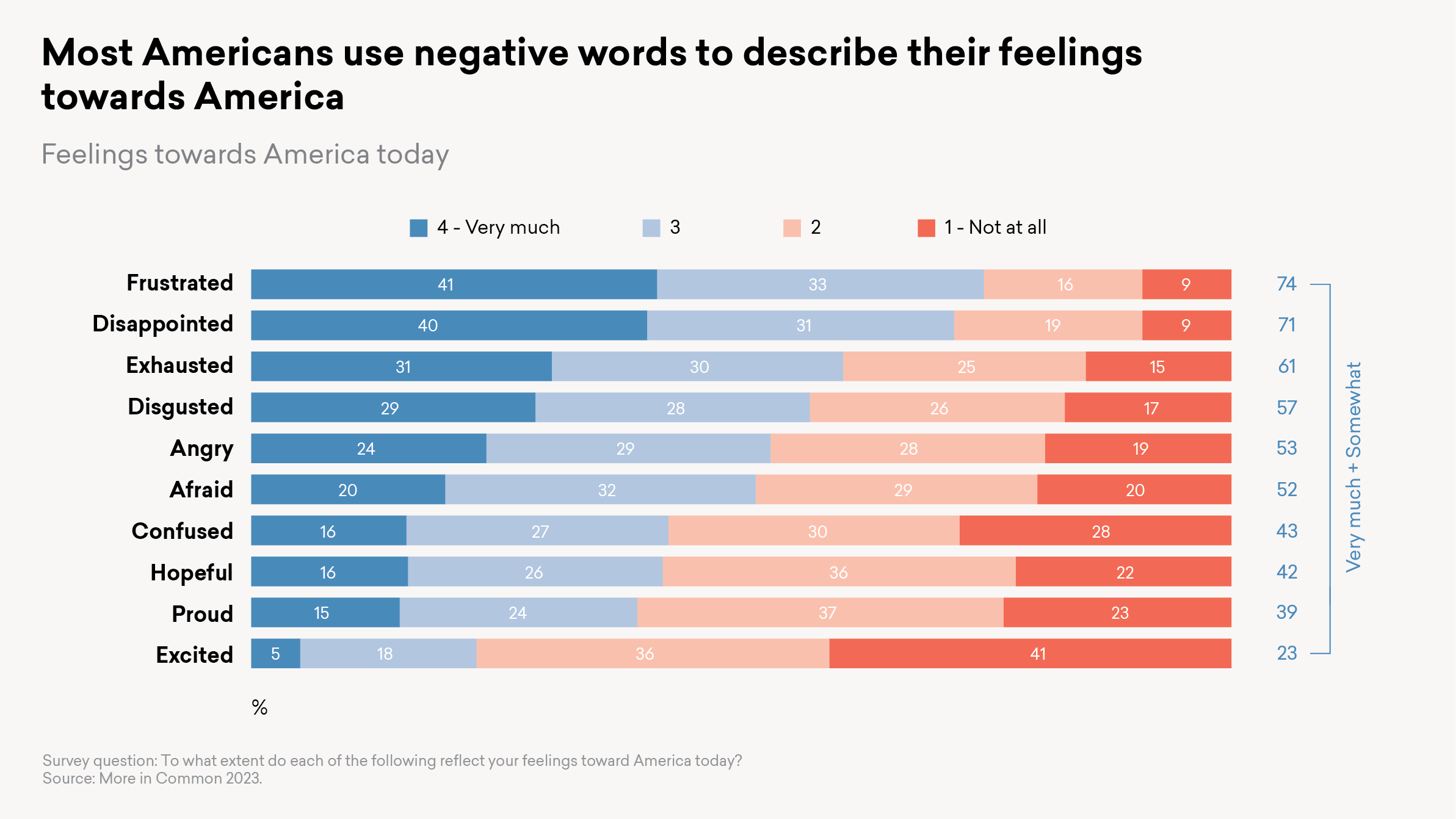
Summary: New research provides insights into Americans’ anxieties, frustrations and desire for a positive vision for the country ahead of the State of the Union.
On Tuesday February 7th, 2023, President Joe Biden will deliver his State of the Union Address (SOTU), and the GOP will deliver a response. These speeches will receive widespread coverage and are a key opportunity to speak to the nation.
We conducted research shortly after the midterms that provided insights into how Americans are feeling about our country, political parties, and what they think the most important issues are for Republicans and Democrats.
Our findings show an overwhelming number of Americans feel highly negative towards our country and have less hope and excitement than they did after the 2018 midterms. They are also more divided in their support for compromise than they were in 2018, though the Exhausted Majority continues to favor people coming together. Americans feel threatened by political extremism, and despite misperceptions of what Republicans and Democrats think are priority issues for the other party, Americans across parties are mostly concerned about inflation.
Below are key takeaways from our latest report, SOTU 2023: Speaking To The Exhausted Majority, and how they can be leveraged by our political leaders to lift the mood of the country as they speak to the nation this Tuesday.
Key Takeaways
👉 Americans are losing hope and excitement in our country.
The majority of Americans are frustrated (74%), exhausted (61%), and angry (53%). Harboring these feelings towards our country could pose risks that Americans become disconnected, unmotivated to engage, and apathetic—all impediments to maintaining a healthy and vibrant democracy. The SOTU provides an opportunity for our political leaders to share a message that aims to lift Americans’ attitudes and provide reminders that despite our very real challenges, there is reason for hope in this country and in our ability to govern.
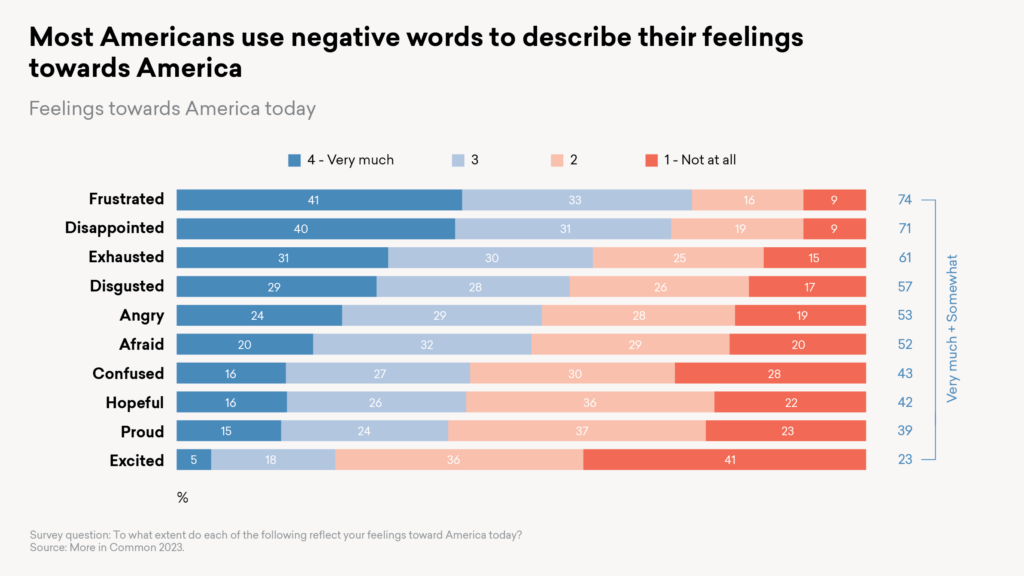
👉 Americans feel threatened by our political climate.
Two thirds of Americans (65%) think that extremists on both sides of the political spectrum present a threat to the United States and most (85%) think that the greatest threat to our country is domestic rather than foreign. A majority of Americans also feel like they don’t have a voice in our political climate. On Tuesday, the President and GOP should resist temptations to cast the “other side” as an enemy, as doing so only provides fuel to conflict entrepreneurs who are incentivized to stoke division and build a false reality that we are more divided than we think.
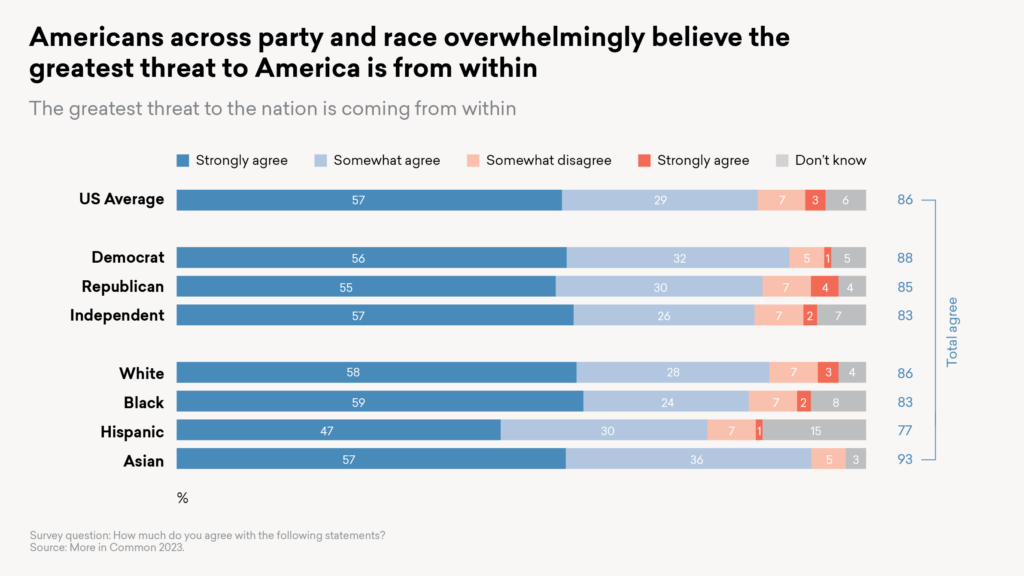
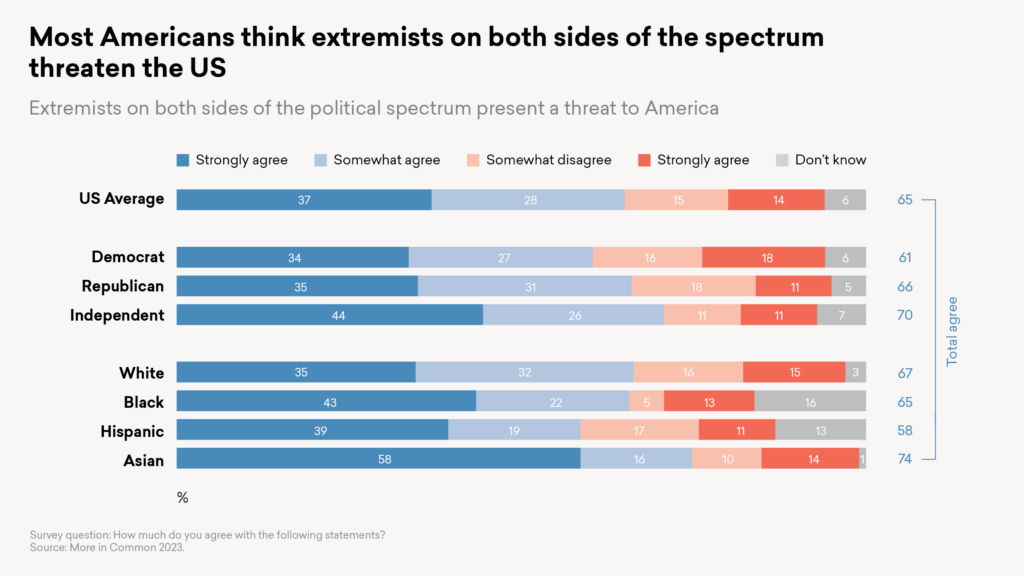
👉 Independents used their vote in the midterms to prevent a negative vision instead of voting for a positive one.
Over half (56%) of Independents (compared with 33% of Republicans and 44% of Democrats) voted to prevent a negative vision from taking over the country instead of voting for a positive vision. As the country’s largest voting block, this provides an opportunity for both parties to use their messages to make a case and provide tangible examples for what each party is for rather than against. By creating a hopeful, positive vision, built on a foundation of practical solutions, Americans can be empowered to better and more constructively determine how they can support a vision they want for the country and how they think it should be achieved.
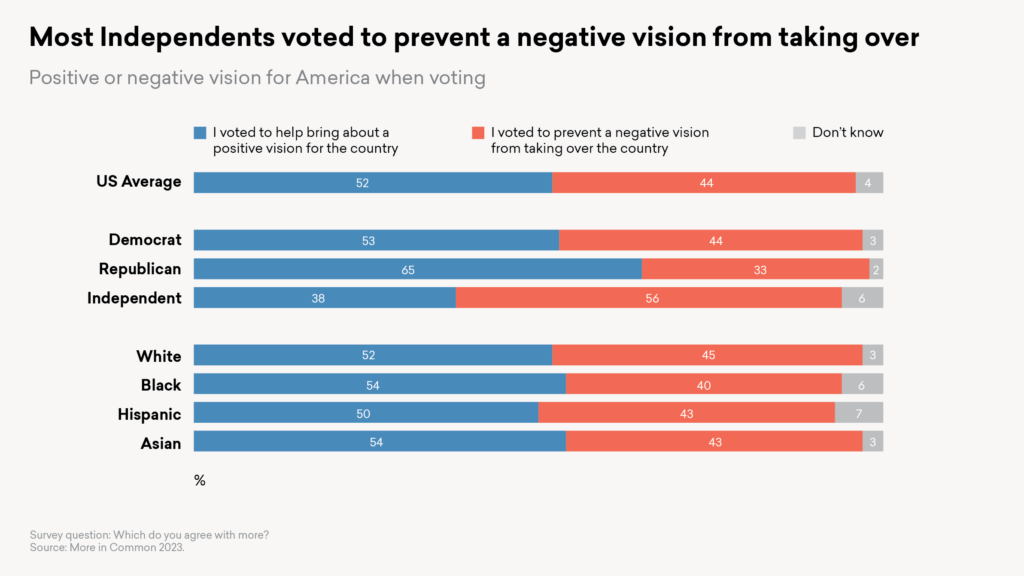
👉 Despite misperceptions, Republicans’ and Democrats’ top issue is the economy.
As we have found in our previous perception gap research, Democrats and Republicans consistently misunderstand what the other side believes and prioritizes. When asked about what each party’s top policy issues are, Democrats thought that election fraud is the top issue for Republicans. Conversely, Republicans believed that climate change and LGBTQ issues are Democrats’ top priority. In reality, Americans across parties are most concerned about inflation. Speaking to these economic concerns should be prioritized in the SOTU and GOP response, ideally with the recognition that this is a top priority among Americans across parties.
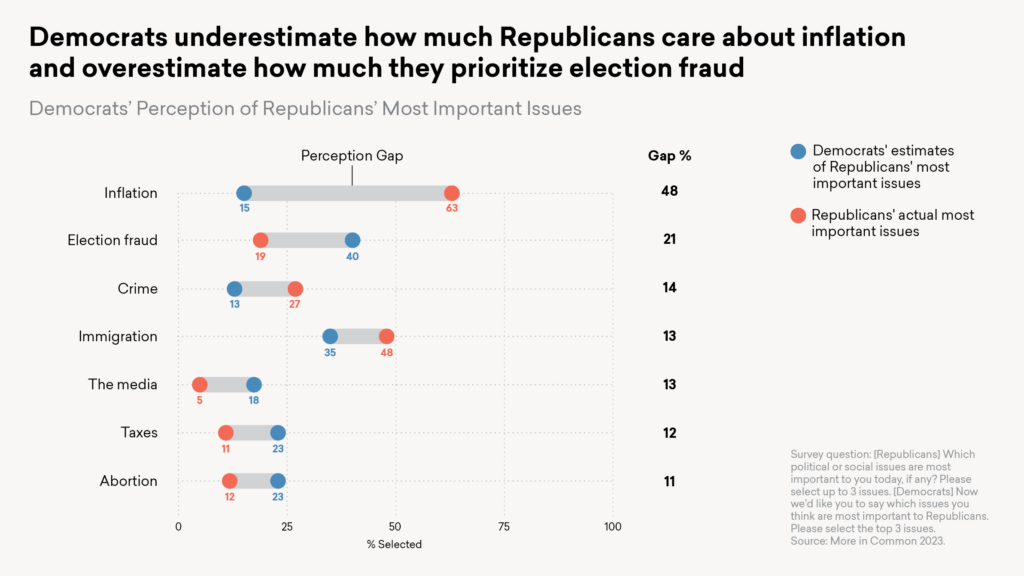
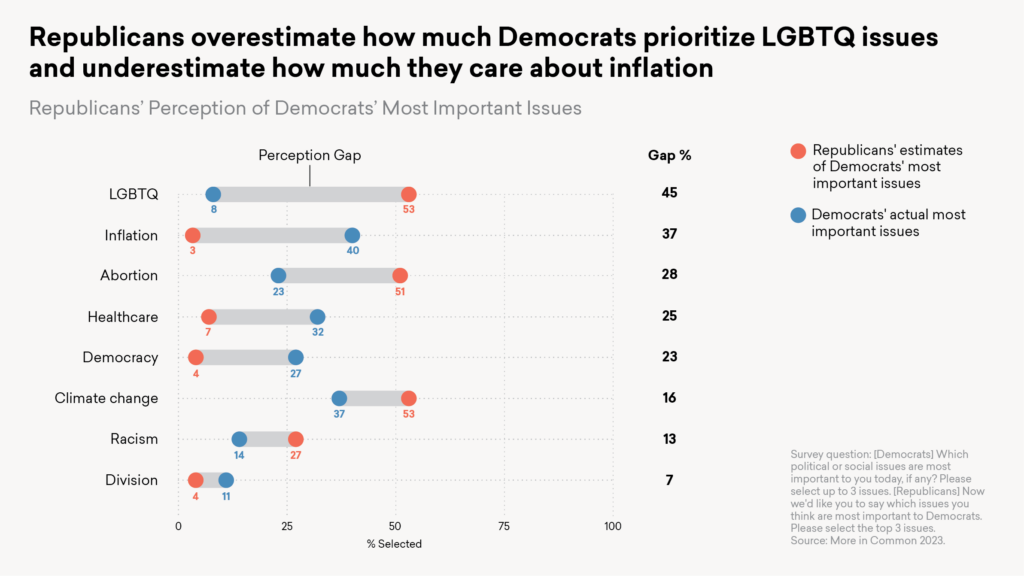
Conclusion
Americans are eager for a departure from the ‘us versus them’ narratives that dominate politics in the current era. We recognize that articulating a positive vision for the country that can resonate with an exhausted American population is a daunting communications challenge. But there remains a deeply-rooted conviction that there is a better way forward. Leaders on both sides of the aisle can model and articulate that path in order to empower Americans to have hope and excitement that a better way in politics is possible.
We are hiring!
Love data as much as we do? Join our team! More in Common US is hiring for two new research positions and a grants and development consultant. Descriptions/application instructions are as follows:
👉 Senior Researcher (Full-Time): This role is for a mission-driven individual with extensive research and managerial experience. The Senior Researcher will work closely with the US Director and Director of Research to design, execute, analyze and present research that aims to better understand the American public as well as defuse political polarization and strengthen social cohesion. The full job description is here. The application deadline is February 10.
👉 2-3 Research Fellows (Part-Time): The paid fellowship is for advanced PhD students interested in conducting applied research relating to either social cohesion; social contact theory; pro-social norms, behaviors, and emotions; communications in a polarized context; and/or political polarization. The fellowship will start in late May/early June and continue through the end of 2023. The full fellowship description is here. The application deadline is February 10.
👉 Grants and Development Consultant (Contractor) – More in Common is looking for a highly organized, mission driven individual who has experience and enthusiasm for managing grant processes, drafting grant reports and proposals, and telling the story of our work to funders. The contract would run late February- August (with possibility of extension) for ~10 hours/week. The full description is here.
Fellowship Opportunity at SNF Agora
Our friends at Johns Hopkins SNF Agora Institute, an academic and public forum dedicated to strengthening global democracy and expanding civic engagement, are currently welcoming applications for their 2023-24 SNF Agora Visiting Fellows cohort. Interested applicants can apply here or can visit their FAQ section for more information. Applications will be accepted until Sunday, March 5, at 11:59 p.m.
Questions can be directed to their email at: snfagoraapplications@jhu.edu.